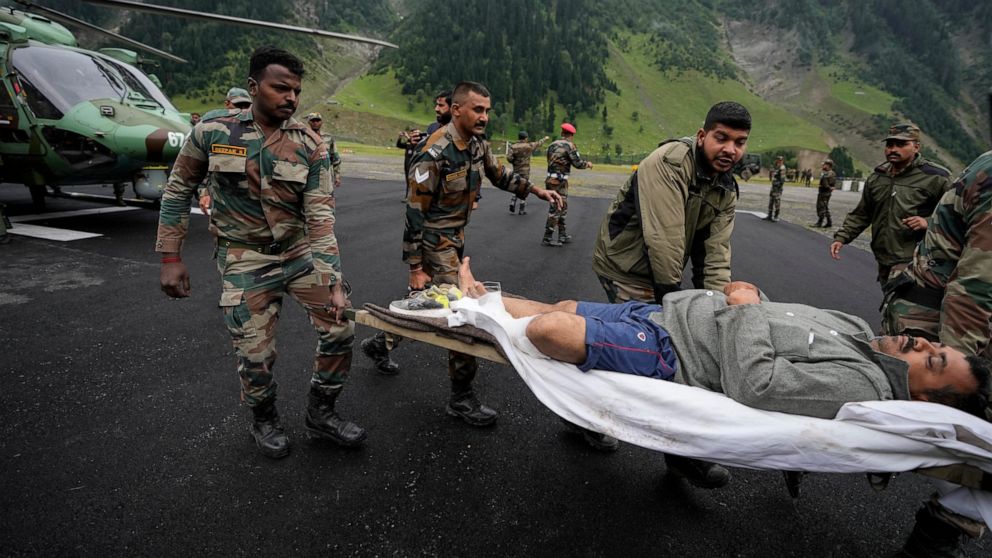Emergency workers have rescued thousands of pilgrims after flash floods triggered by sudden rains swept through their makeshift camps during an annual Hindu pilgrimage to an icy Himalayan cave in Indian-controlled Kashmir
The Associated Press
July 09, 2022,

Indian army soldiers carry an injured of a cloudburst for treatment, at Baltal, 105 kilometers (65miles) northeast of Srinagar, Indian controlled Kashmir, Saturday, July 9, 2022. At least eight pilgrims have been killed after a cloudburst triggered a flash flooding during an annual Hindu pilgrimage
SRINAGAR, India -- Emergency workers rescued thousands of pilgrims after flash floods triggered by sudden rains swept through their makeshift camps during an annual Hindu pilgrimage to an icy Himalayan cave in Indian-controlled Kashmir, officials said Saturday. At least 16 people have died and dozens were injured.
Authorities suspended the pilgrimage for two days as rains continued to lash the region. Teams of rescuers combed through the slippery mountain tracks and used sniffer dogs and through-the-wall radars to locate dozens of missing amid inclement weather. Civilian and military helicopters evacuated the injured to hospitals.
The heavy rain Friday evening near the mountain cave revered by Hindus sent a wall of water and boulders down a gorge and carried away about two dozen camps and two makeshift kitchens, officials said. Thousands of people were in the mountains when the rains struck.
Officials said about 15,000 devotees were moved to safer locations and at least five dozen injured were administered first aid at base camp hospitals set up for the pilgrimage, which is undertaken by hundreds of thousands of Hindus from across India.
Groups of pilgrims are staggered over 1 1/2 month for security and logistical reasons.
The Amarnath pilgrimage began on June 30 and tens of thousands of devotees have already visited the cave shrine where Hindus worship Lingam, a naturally formed ice stalagmite, as an incarnation of Shiva, the god of destruction and regeneration.
This year, officials expect nearly 1 million visitors after a two-year gap due to the coronavirus pandemic.
Worshippers trek to the cave along two routes through lush green meadows and rocky and forested mountain passes with a view of glacial lakes and snowy peaks. A traditional route via the southern hill resort of Pahalgam takes three days while a trip through northeastern Baltal lasts one day. Some pilgrims use helicopter services to make quick visits.
The cave, at 13,500 feet (4,115 meters) above sea level, is covered with snow most of the year except for the short summer period when it is open to pilgrims.
Hundreds of pilgrims have died in the past due to exhaustion and exposure to harsh weather during the journey through the icy mountains. In 1996, thousands were caught in a freak snowstorm, leading to more than 250 fatalities.
The pilgrimage concludes on Aug. 11, a full-moon night that Hindus say commemorates Shiva revealing the secret of the creation of the universe.
No comments:
Post a Comment